Rabbits might seem to have an unlimited supply of energy, however, rabbits actually sleep a lot, in fact, most rabbits get (at least!) 8 hours of sleep per day. If you are wondering why you never see your rabbit sleeping we’re here to tell you that you probably have (you just don’t know it yet).
Rabbits can sleep with their eyes open or closed. Sleeping rabbits often flop onto their sides, or stretch out on their fronts. A rabbit sleeping with its eyes open will display shallower breathing.
Due to their tendency to sleep with their eyes open, it can be difficult to tell if your bunny is really asleep or if he’s planning world domination! here are the main things to look out for if you are trying to determine if your rabbit is sleeping.
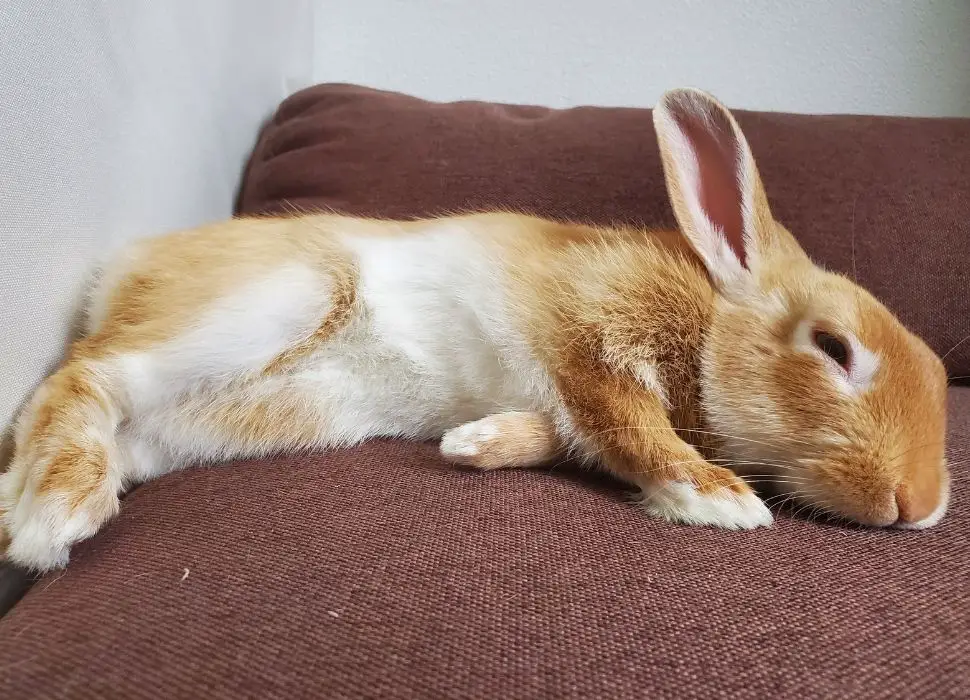
Signs a Rabbit is Sleeping
Nose blinking stops and breathing slows
Rabbits’ noses twitch (or blink) continuously to increase the airflow over the sensitive glands within the nose, identifying smells quickly to detect predators or seek out food or water. Nose blinking also aids breathing and is a rabbit’s main means of communication with other rabbits. When the rabbit is sleeping and the rabbit becomes less alert the blinking slows or stops and breathing becomes shallower.
Twitching
Animals dream just like us. Rabbits probably dream about their favorite toy or meadow and may start twitching their legs or any other body part when they imagine themselves running or binkying! Twitching is a good indication that the rabbit might be in a deep slumber.
Snoring
Rabbits do snore sometimes when they are asleep however be aware that excessive snoring could indicate the need to visit a veterinarian, snoring can in some cases indicate a blockage or abnormality in the rabbits airway
Ear Position
Rabbit ears can rotate independently of each other and survey their surroundings constantly for threats. Any rabbit whose ears are relaxed, close against the body, and not moving is likely to be asleep.
Are Rabbits Nocturnal?
Rabbits are not nocturnal, they are in fact crepuscular (a Latin word for ‘twilight’) which means that they are most active at dawn and dusk.
As prey animals at the bottom of the food chain alongside cattle and sheep, wild rabbits know that they are less likely to be spotted by predators during twilight when light is lower so they use these hours in which to graze, forage for food, and play.
Rabbits are also very susceptible to heatstroke and can die if they are left exposed to extremes of temperature or humidity for long periods of time.
They do have very small sweat glands in their mouths but they are not very efficient when it comes to regulating body temperature.
By going out during dawn and dusk when the sun is lowest in the sky rabbits also minimize the risk of heat exhaustion – especially when water may be scarce.
With caring owners to watch their backs, domestic rabbits don’t usually have to be as concerned about predators or overheating as their wild relatives, however, they still retain the same survival instincts and behaviors
When Do Rabbits Sleep?
A rabbit’s sleeping pattern usually consists of two long periods of sleep of a few hours (mid to late morning and middle of the night) with a few shorter less intense daytime naps as and when they feel tired. Domestic rabbits will settle into a routine but you’ll usually find that they are awake just in time for breakfast!
How Many Hours a Day Do Rabbits Sleep?
Although rabbits usually sleep for an average of around 8 hours a day, made up of several small naps studies of male rabbits have shown this to be even longer.
Do Rabbits Sleep in the Dark?
Rabbits can sleep just as comfortably in the light as they can in the dark however wild rabbits spend a lot of time inside their warrens.
Warrens are connected through a series of burrows and although light may penetrate through these entrance points in the daytime (imagine your bedroom with the curtains closed) the warrens are completely pitch black once the sun goes down.
Wild rabbits know instinctively when it is a safe time to venture outside the burrow to forage.
Domestic rabbits have no problems with the dark however if you have a free-roam house bunny and a house with creaky floorboards, you may hear a few rabbit foot thumps in the middle of the night.
This is a rabbit’s way of alerting companions of potential danger (If this is something you have experienced with your own bunnies we have found that leaving a lamp on for the bunny somewhere in the house can help).
Do Rabbits Sleep With Their Eyes Open or Closed?
One physical attribute that a rabbit has is the ability to sleep with the eyes open or closed. Unlike humans who blink constantly (to prevent our eyes from drying out), rabbits have a third eyelid and blink much less frequently. This is known as a ‘nictitating membrane’.
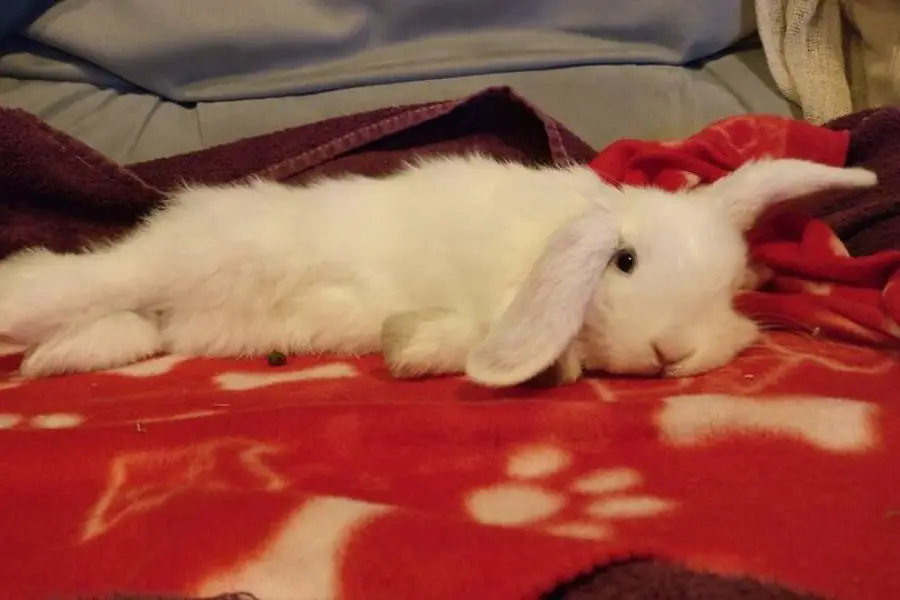
The membrane forms an inner eyelid in front of the cornea which can be drawn across the eye to keep it moist and protected from dust. Rabbits can sleep both with their eyes open or closed and will instinctively decide which based on how safe they feel in their environment.
Why Do Rabbits Sleep With Their Eyes Open?
Rabbits would not have survived in the wild without evolving a number of amazing senses, instincts and physical attributes.
From their acute hearing (ears that are able to rotate independently to pinpoint the location of a sound) to having an extremely wide peripheral range of vision (allowing them to see almost 360 degrees) rabbits have been able to thrive on every continent.
Sleeping with the eyes open is just another one of a rabbit’s amazing physical attributes that has helped them to survive.
Naturally, wild rabbits are more likely to sleep with their eyes open as by closing them they are at an increased risk of a predator sneaking up on them.
Predators are a lot more likely to think they can make a meal out of a rabbit when it is asleep and less likely to run away.
Domestic bunnies can afford to be a bit more relaxed (especially those lucky enough to share your home) although if your bringing a new bunny home for the first time (i.e. a rescue that is not relaxed around humans) or the home is shared with your other pets (or small children) your bunny may be cautious and more inclined to sleep with (at least) one eye open.
What Position Does a Rabbit Sleep In?
Rabbits are individuals each with their own personalities and as such, they are only bound by their physical capabilities when it comes to sleeping positions. Some rabbits may even roll completely over with their legs in the air if they feel comfortable.
That said, there are a few standard positions that you are most likely to see your rabbit sleeping in as described below with pictures of our own bunnies perfectly demonstrating each.
The Loaf
Demonstrated below by our own bunnies Snowball and Nerys and commonly referred to as ‘the loaf’ this is the sleeping position of choice for cautious rabbits who are not yet familiar with their surroundings.
The rabbit will tuck its legs under the torso, lower its head, relax the ears, and with eyes half-open squeeze its body into a tight ball, resembling a loaf of bread.
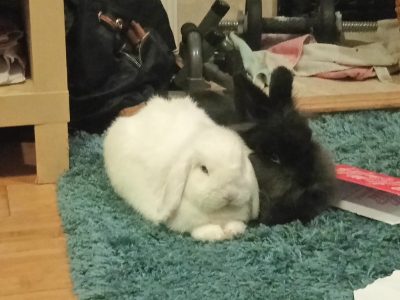
Outstretched Position
Demonstrated here by ‘Baby’ this position is where a rabbit stretches out all its faculties to the extreme! the rabbit lies flat with its belly on the floor, rear legs stretched out behind, and front legs stretched out in front, bunnies demonstrating this may be relaxed or if they are doing it on a tiled kitchen floor may enjoy the cool feeling on their tummies.
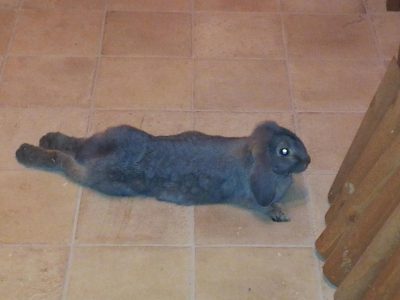
Bunny Flop
As demonstrated here by another of our rabbits ‘Princess’ relaxed rabbits will roll onto their sides or even on their backs.
A favorite way to do this is to first twist the head sideways before flinging the rest of the body into line so that the feet fly out to the side. This position indicates a very comfortable bunny (Princess had just been given a new blanket!).
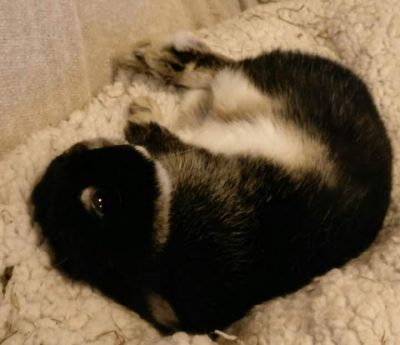
Can I Make My Rabbit Sleep at Night?
No. Rabbits are free spirits who love to play so it’s unlikely that you’ll be able to make them sleep when you want them to.
However, one of the best things about rabbits as pets is that they are awake in the morning as soon as you get up, sleep during the day while you are at work, and are ready to play when you get home late in the afternoon.
A rabbits playtime can extend far past our own bedtime and while rabbits won’t disturb the neighbors by barking well into the night as a dog may do, rabbit play may involve digging (usually your favorite rug!), chewing (usually your favorite boots!) knocking into things while zooming around (favorite ornament!) and foot thumping, as you can imagine, all of these can be fairly distracting at 03:00 am!
While you might not be able to stop a rabbit from following its instincts, there are a few things you could try to ensure you can still get a good night’s sleep.
3 Tips to Get a Rabbit to Sleep
- If your rabbit has a full run of the house during the day consider confining the rabbit to one area at night time. This could be a kitchen or a large puppy pen like the one linked below on Amazon. This will ensure your bunny’s nighttime activities are confined to one space and allow you to control the area better.
- Provide interesting enrichment activities for the rabbit to enjoy while you are asleep. Bored rabbits are more likely to get up to mischief when the lights go out. Interesting toys (even a simple cardboard box) to chew and play with means that your carpet and your boots will be safe!
- Allow the rabbit plenty of time outside in a safe and secure run to play during their most active hours. This allows the rabbit the opportunity to burn off excess energy and be more likely to want to sleep at a reasonable hour.
Remember, it takes a long time for rabbits to be comfortable enough in their surroundings to be able to sleep in front of you and some never will.
Don’t take it to heart, all rabbits are different personalities. The most important thing to remember is to always treat your pet with kindness, and provide them with a safe and comfortable environment, a healthy diet, and plenty of enrichment.
Further Reading
Sleep Habits of Hoppy Bunnies verlo.com
Can you tell if your rabbit is asleep? smallpetselect.com
How Do You Know When a Rabbit is Sleeping? petkeen.com
Frequently Asked Questions
Why do rabbits sleep with their eyes open?
Rabbits sleep with their eyes open as a defense mechanism. The third eyelid or nictitating membrane keeps their eyes moist and protects them from predators.
Can rabbits sleep with their eyes closed?
Rabbits can sleep with their eyes closed or open, but they tend to close their eyes during deep sleep. As prey animals, rabbits are more alert with their eyes open to spot potential predators.
How much sleep do rabbits need?
Rabbits need around 8-9 hours of sleep per day, but this can vary based on age, activity level, and environment. They are most active during the early morning and evening hours.
What are the signs of sleep in rabbits?
When rabbits are in a deep sleep, their muscles relax, and they may flop on their sides. They may twitch or kick slightly in their sleep, but their breathing will be slow and steady.
Can a rabbit sleep during the day?
Yes, rabbits are crepuscular animals, which means they are most active during dawn and dusk, but they can sleep during the day as well. They often take naps throughout the day between periods of activity.

